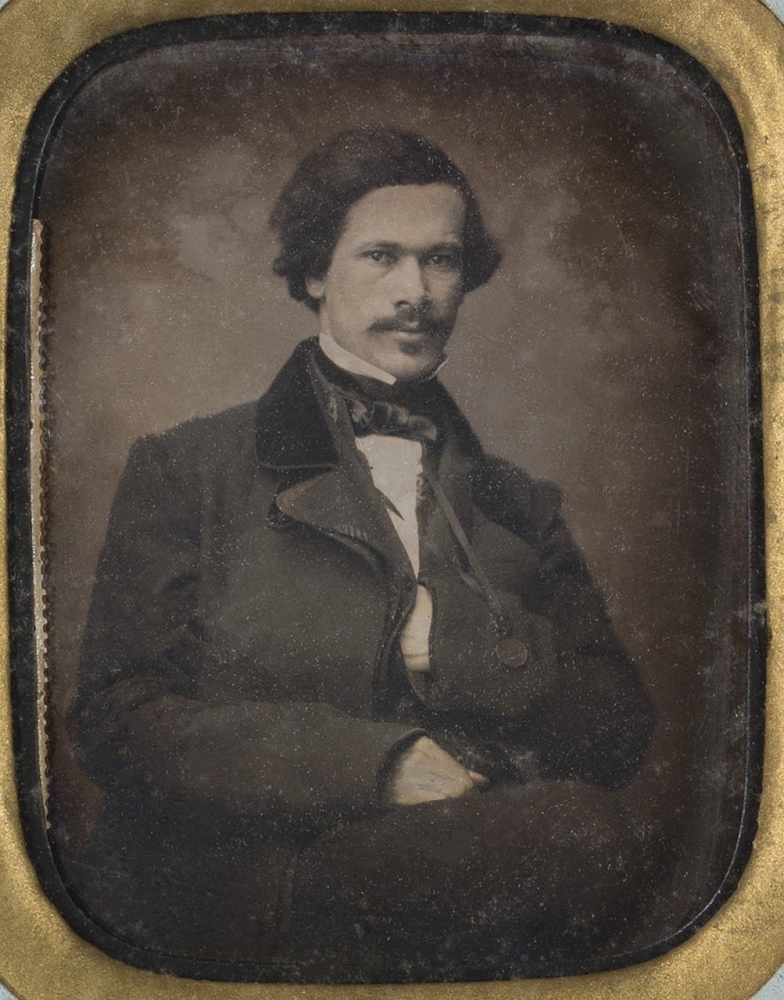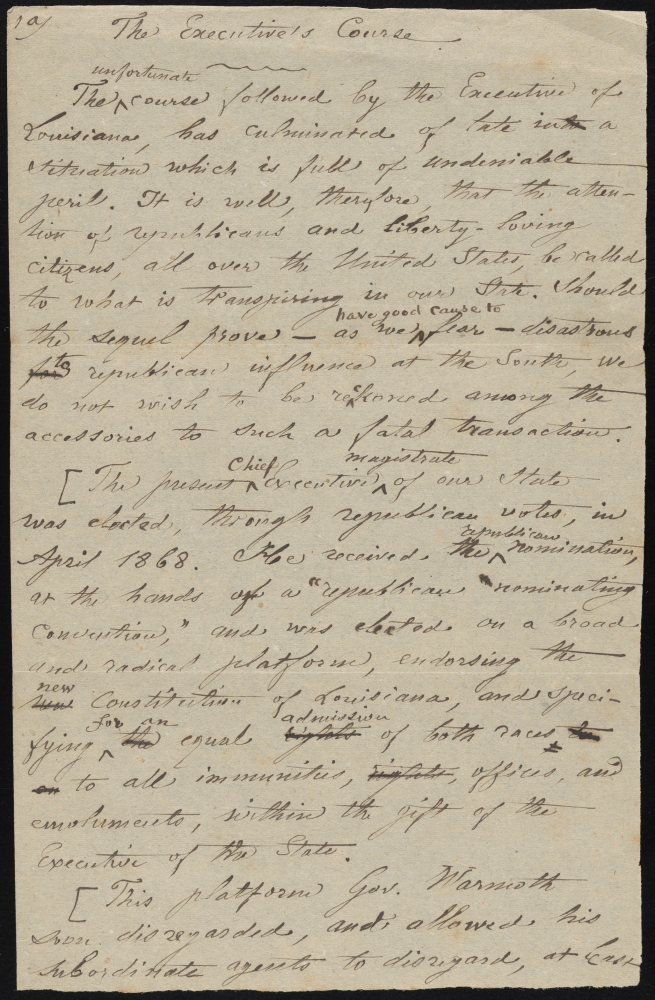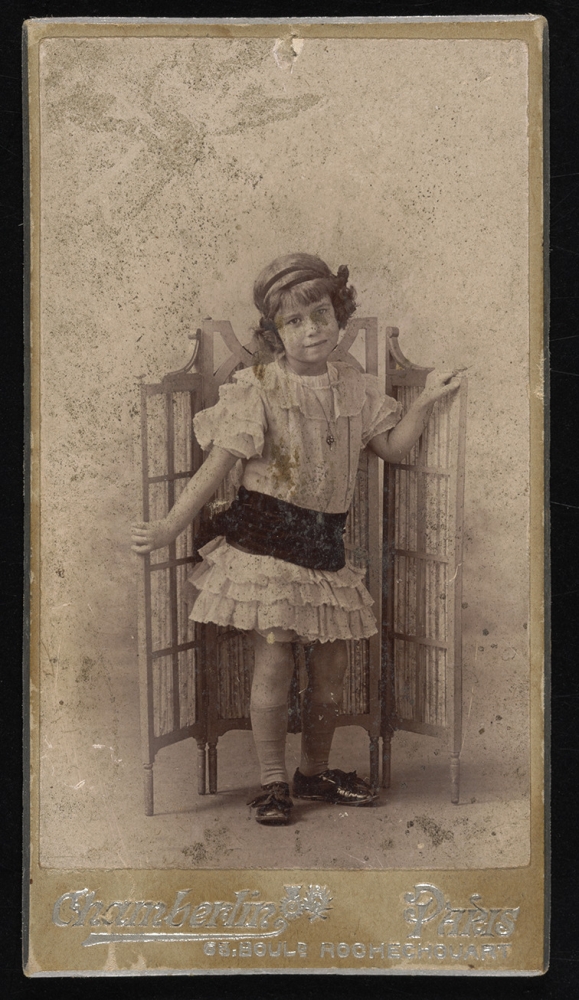Since 2015 THNOC has sought to acquire a collection of essays and family papers related to Dr. Louis Charles Roudanez, the Creole physician and newspaperman who became a leader of the Reconstruction-era civil rights movement in New Orleans. This summer, they arrived at The Collection following a lengthy trip from France, where they had been passed down through the Roudanez family to Dr. Catherine Jouve, his great-granddaughter. This substantial collection—41 items including undated manuscript essays and family correspondence—offers a thrilling look at one of the most influential people in the early struggle for African American civil rights in Louisiana.

(THNOC, gift of Mark Charles Roudané, 2017.0201)
Louis Charles Roudanez was born in 1823 in St. James Parish to a white Frenchman and a free woman of color, both immigrants from Saint-Domingue (Haiti). Roudanez studied medicine in France in the 1840s. Inspired by the uprisings taking place there, he manned the barricades in Paris during the Revolution of 1848. He returned to New Orleans in the mid-1850s to open a medical practice in the French Quarter.
Roudanez’ revolutionary spirit was reignited during the American Civil War. After the capture of New Orleans by the Union in 1862, he cofounded L’Union, the first Black newspaper in the South. Published in French, with an English edition added in 1863, it advocated for abolition, voting rights, and Black participation in the military. When L’Union ceased publication after just two years, Roudanez founded another newspaper, La Tribune. As Clint Bruce writes in his introduction to Afro-Creole Poetry in French from Louisiana’s Civil War–Era Newspapers, the newspapers’ blend of politics and poetry “brought the Creole poets’ francophone worldview . . . to bear on the turbulent but promising circumstances of the Civil War and Reconstruction.”
Roudanez also became chairperson of the Unification Movement, a group dedicated to building a multiracial community in New Orleans. As Reconstruction ended and white supremacy reemerged, that dream died. Life became increasingly difficult for people of color in the city, so in 1879 Roudanez sent his wife and children to live in Paris. He died in New Orleans on March 11, 1890, and is buried in St. Louis Cemetery No. 1.

“The Executive’s Course" (THNOC, MSS 1072.1.1)
The essays in the collection are all six to eight pages in length. About half are written in French, half in English, and the bulk deal with Republican party politics during Reconstruction. Titles include “The Last Step toward Civil Equality,” “Chacun est le fils de ses oeuvres” [We are all the children of our works], and “Soyez de votre temps” [Be a person of your era]. The essays are undated, but references to Reconstruction-era figures such as Governor Henry Clay Warmoth in “The Executive’s Course” (above) suggest that they were written in the late 1860s and ’70s, during the run of La Tribune (1864–77).
Roudanez was a leader of a Republican faction that represented the interests of newly enfranchised Black voters. In his essay “Some of the Proscribed Castes,” he remarks on the promise made by the 15th Amendment, which grants suffrage to men regardless of race: “This community is just emerging from slavery. We do not speak only of the slaves but of the masters, upon whom the blighting effects of holding men and women in bondage are highly discernible. . . . Let us therefore persevere and march on. . . . Let us have equality, justice, peace, and union among our citizens. The time has come for it. Let persecutions, injustices, silly distinctions, and above all bloodshed and violence, be repudiated forever.” The two other factions within the Republican Party were less egalitarian in their motives, and party infighting presented urgent barriers to progress during Reconstruction, which Roudanez addresses in the essays “Planks XII and XIV” and “The Safety of the Republican Party,” among others.
In addition to the 27 essays, the collection includes a group of letters from Roudanez in New Orleans to his family in Paris, after they fled the worsening racial climate in the United States. Roudanez and his wife, Célie, had 10 children—five boys and five girls—seven of whom survived to adulthood.

The only photograph in the collection is of Dr. Roudanez’ daughter Louise, who passed away two months shy of her 12th birthday. (THNOC, MSS 1072.2.15)
The letters show Roudanez to be a doting father, proud of his children’s accomplishments but more invested in the development of their minds and characters than in achievement alone. “I admire Chiffon’s and Emma’s intention to return courageously to their studies, but I really hope this will not be studying for any upcoming exam,” he writes in a letter dated January 5, 1880. “I will be devastated to learn in the future, that they study for anything other than to learn. When they are well educated, there will be more than enough time to take exams. Do not believe that people who constantly take exams are the most learned.” In the same letter, he grows sentimental about the separation from his family: “I’m acting like a Grandmother at the moment. I have, eyes closed, so many memories of my dear children.”
The letters indicate that he was dearly beloved in return. In the months leading up to his death, Roudanez downplayed the unspecified illness that took his life, telling the children not to worry. On May 22, 1890, two months after his death, Célie wrote to officially share the news. “My dear, poor children, It is useless to hide from you any longer our great misfortune. Alas, my dear children, our best Friend, our help, our support, is not among us today. . . . a loss which brings us to tears and more by the emptiness which it leaves around us. How used we were to letting ourselves be guided and directed by our father who was so loving, so good, so devoted.”
Translations of letter excerpts from the French by Howard Margot. Roudanez genealogical research by Jari C. Honora.
About The Historic New Orleans Collection
Founded in 1966, The Historic New Orleans Collection is a museum, research center, and publisher dedicated to the stewardship of the history and culture of New Orleans and the Gulf South. Follow THNOC on Facebook and Instagram.












